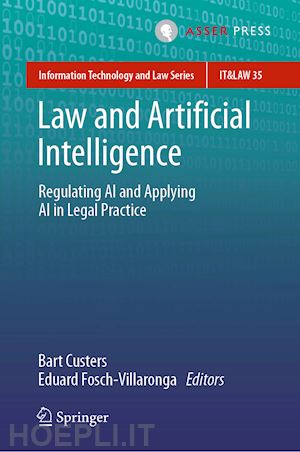
Questo prodotto usufruisce delle SPEDIZIONI GRATIS
selezionando l'opzione Corriere Veloce in fase di ordine.
Pagabile anche con Carta della cultura giovani e del merito, 18App Bonus Cultura e Carta del Docente
Part I. Introduction.- Chapter 1. Humanizing Machines: Introduction and Overview.- Chapter 2. Artificial Intelligence versus Biological Intelligence: A Historical Overview.- Chapter 3. Disciplines of AI: An Overview of Approaches and Techniques.- Part II. Public Law.- Chapter 4. Discrimination by Machine-based Decisions: Inputs and Limits of Anti-discrimination Law.- Chapter 5. Women's Rights under AI Regulation - Fighting AI Gender Bias through a Feminist and Intersectional Approach.- Chapter 6. Diversity and Inclusion in Artificial Intelligence.- Chapter 7. Artificial Intelligence in Disability Employment: Incorporating a Human Rights Approach.- Chapter 8. Prosecuting Killer Robots: Allocating Criminal Responsibilities for Grave Breaches of International Humanitarian Law Committed by Lethal Autonomous Weapon Systems.- Chapter 9. The Risks of Social Media Platforms for Democracy: A Call for a New Regulation.- Chapter 10. Biased Algorithms and the Discrimination upon Immigration Policy.- Chapter 11. AI in Criminal Law: An Overview of AI Applications in Substantive and Procedural Criminal Law.- Chapter 12. Black-box Models as a Tool to Fight VAT Fraud.- Part III. Private Law.- Chapter 13. Bridging the Liability Gaps: Why AI Challenges the Existing Rules on Liability and How to Design Human-empowering Solutions.- Chapter 14. Contractual Liability for the Use of AI under Dutch Law and EU Legislative Proposals.- Chapter 15. Digging into the Accountability Gap: Operator’s Civil Liability in Healthcare AI-systems.- Chapter 16. Automated Care-taking and the Constitutional Rights of the Patient in an Aging Population.- Chapter 17. Generative AI and Intellectual Property Rights.- Chapter 18. The Role and Legal Implications of Autonomy in AI-driven Boardrooms.- Chapter 19. Artificial Intelligence and European Competition Law: Identifying Principles for a Fair Market.- Chapter 20. Personalised Shopping and Algorithmic Pricing: How EU Competition Law Can Protect Consumers inthe Digital World.- Part IV. Legal Practice.- Chapter 21. Lawyers’ Perceptions on the Use of AI.- Chapter 22. AI and Lawmaking: An Overview.- Chapter 23. Ask the Data - A Machine Learning Analysis of the Legal Scholarship on Artificial Intelligence.- Chapter 24. The Study of Artificial Intelligence as Law.- Chapter 25. The Right to Mental Integrity in the Age of Artificial Intelligence Cognitive Human Enhancement Technologies.- Chapter 26. Regulating Artificial General Intelligence (AGI).- Chapter 27. Influence, Immersion, Intensity, Integration, Interaction: Five Frames for the Future of AI Law and Policy.- Index.











Il sito utilizza cookie ed altri strumenti di tracciamento che raccolgono informazioni dal dispositivo dell’utente. Oltre ai cookie tecnici ed analitici aggregati, strettamente necessari per il funzionamento di questo sito web, previo consenso dell’utente possono essere installati cookie di profilazione e marketing e cookie dei social media. Cliccando su “Accetto tutti i cookie” saranno attivate tutte le categorie di cookie. Per accettare solo deterninate categorie di cookie, cliccare invece su “Impostazioni cookie”. Chiudendo il banner o continuando a navigare saranno installati solo cookie tecnici. Per maggiori dettagli, consultare la Cookie Policy.